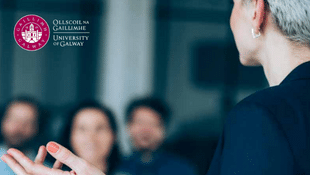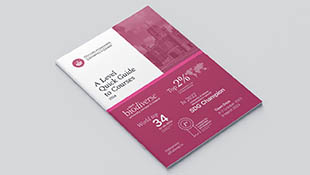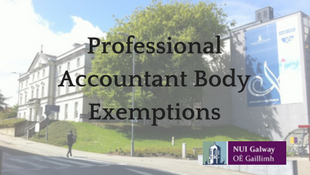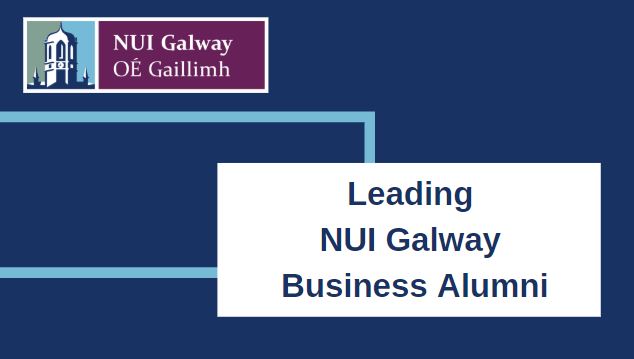-
Courses

Courses
Choosing a course is one of the most important decisions you'll ever make! View our courses and see what our students and lecturers have to say about the courses you are interested in at the links below.
-
University Life

University Life
Each year more than 4,000 choose University of Galway as their University of choice. Find out what life at University of Galway is all about here.
-
About University of Galway

About University of Galway
Since 1845, University of Galway has been sharing the highest quality teaching and research with Ireland and the world. Find out what makes our University so special – from our distinguished history to the latest news and campus developments.
-
Colleges & Schools

Colleges & Schools
University of Galway has earned international recognition as a research-led university with a commitment to top quality teaching across a range of key areas of expertise.
-
Research & Innovation

Research & Innovation
University of Galway’s vibrant research community take on some of the most pressing challenges of our times.
-
Business & Industry

Guiding Breakthrough Research at University of Galway
We explore and facilitate commercial opportunities for the research community at University of Galway, as well as facilitating industry partnership.
-
Alumni & Friends

Alumni & Friends
There are 128,000 University of Galway alumni worldwide. Stay connected to your alumni community! Join our social networks and update your details online.
-
Community Engagement

Community Engagement
At University of Galway, we believe that the best learning takes place when you apply what you learn in a real world context. That's why many of our courses include work placements or community projects.
Phd Research
The Management Discipline hosts a vibrant research community of PhD scholars. We research across a broad range of research topics.
Meet our Current PhD Students
Corruption, Intimidation and Organization Wrong-doings: The Cross Country Comparison of Whistleblowing Policy as Potent Antidotes - Bashir Alao

Overview: Whistleblowing is currently the most effective tool to combat fraud and wrongdoings in every organization. One of the key obstacles in the fight against corruption is the fact that, without legal protection, individuals are often too intimidated to speak out or blow the whistle. Various recent laws aim at improving the protection of whistle-blowers and enhancing their willingness to report. Evidence on the effectiveness of such legislation is, however, scarce. The research project will analyse the effect of enacted whistleblower protection legislations and compare different legal regimes concerning their impact on employers' misbehaviour, employees' truthful and fraudulent reports, and employers' retaliation. While research into this area has been ongoing since the 1980s, it has overwhelmingly focused on Western and Anglo-saxon countries. My interest is to carry out comparative research (Ireland & Nigeria) on the effectiveness of whistleblowing systems in other parts of the world, particularly the third world nations to have a balanced perspective.
Supervisor: Professor Kate Kenny
Email: B.Alao1@universityofgalway.ie
The Successful Commercialisation of MedTech - Blake Bowers

Overview: Blake's research investigates successful technology commercialisation of MedTech. In the last three years, there has a been a decline in the amount of venture capital attracted by spinouts in Ireland. However, this is not the case for MedTech in general. Blake's research aims to compare Ireland's MedTech sector to other leading hotspots around the world (Munich, Minneapolis, San Francisco, Israel, and Singapore), and further identify how Ireland can further advance its position as a MedTech hotspot.
Supervisors: Professor Jonathan Levie & Dr. Majella Giblin
Scholarship: Blake is funded by Cúram research centre (SFI)
Email: B.BOWERS1@universityofgalway.ie
Regional Innovation Systems: How We Govern Innovation at Local Level - Mike Maguire

Overview: This research will investigate the effectiveness of Regional Innovation System actors in the Galway region, and how global systemic shocks will re-shape the challenges in a changed environment. Qualitative research methods will be used to theorise and conceptualise an understanding of the relationships within the Galway region from a regional innovation systems perspective and seek to answer the four key research questions, as follows:
How have Regional Innovation Systems evolved in recent years, and what learnings have emerged? How might existing theoretical frameworks underpinning Regional Innovation Systems evolve from these learnings? How will operational effectiveness and synergies of actors in Regional Innovation systems need to improve to effect localised regional growth? How can the coalition of a series of actors develop an approach to develop a sustainable regional development system and identify collaborative solutions to social needs?
Supervisors: Dr. Johanna Clancy
Secondary Supervisor: Dr. Pat Collins
Email: m.maguire22@universityofgalway.ie or mike.maguire@universityofgalway.ie
Finding the Model Describing How Whistleblowing Really Works - Maria Batishcheva

Overview: My research spans the whistleblowing area. The key research question is to find the conditions under which the context – both intra-organisational and extra-organisational environment – around whistleblower would be the most conducive to blow the whistle.
Supervisor: Professor Kate Kenny
Email: M.Batishcheva1@universityofgalway.ie
The Management of Scaling Firms & Serial Entrepreneurs - Sarah Bohan

Overview: I have a passion for learning about the internationalisation of firms and entrepreneurship. The aim of this study is to gather the tacit knowledge of serial entrepreneurs, who have scaled successful ventures multiple times, and codify it. It is now more important than ever to build on the research in this field; to understand the bold ambitions of these entrepreneurs, how they pivot, anticipate or seize new opportunities, reflect on failures and enhance the scalability of their business models. I anticipate a wealth of knowledge will come from this research which will contribute to the literature of the processes and mechanisms associated with the management of successful scaling.
In October, I was lucky enough to attend my first international conference at the Institute of Small Business and Entrepreneurship (ISBE) in Cardiff. Even though I am quite early in my PhD journey, I am keen to take any opportunity that allows me to begin building an academic network and present conference papers on my area of research. So, this was an offer I could not refuse and it was a great honour to take home an award for best paper in the track ‘SME growth and performance’ for the paper ‘Bridging Academic and Practitioner Definitions of Scaling Businesses’.
The conference theme was ‘Bridging Enterprise, Policy and Practice: Creating social and public value’. This influenced intriguing paper topics such as the importance of place post-pandemic of the self-employed, rural areas and policies to stimulate SME growth, organizational resilience, and the importance of business model renewal. It was apparent from the conference that innovation and entrepreneurship are alive and flourishing (even in the pandemic of Covid-19), but that business scaling is a real challenge for both policy and practice. It was insightful to learn of the policies and support in Wales available to SMEs and great to be able to talk with others about how practice and policy can begin to converse on how these scaling firms to pursue ‘scaling excellence’, from the perspective of a region outside of Ireland. The conference reiterated the importance of bridging all stakeholders for the greater good of these SMEs. We now face the challenge to build on this paper by continuing these conversations with stakeholders in scaling firms. We can therefore inform policy and practice on what is distinct about scaling firms and how they can create impact in Ireland and beyond.
Reflecting on my experience, I think attending a conference early on in your PhD journey is of great importance. Not only do you begin to put faces to the work of scholars you read and research, but you also start to see the links and possibilities in research with other disciplines and scholars. ISBE stimulated further ideas and avenues of research for me which I can dig deeper into (or even just be aware of during my own research) and I am keen to develop these conversations with scholars at future events and conferences.’
Supervisors: Professor Jonathan Levie and Dr Josephine Igoe
Email: S.BOHAN4@universityofgalway.ie
A Study of Gender and Mental Health in Commercial Aviation Pilots - Kristal Jericho
.png)
Overview: My study aims to examine how binary gender structures, hegemonic masculinity and heteronormativity underpin rigid gender norms within the pilot identity and investigate how the negotiation of masculinities embedded in the cockpit impacts on the mental health and wellbeing of pilots, particularly during industry downturns. My research will also consider how these gendered norms and the pilot identity are threatened by the vulnerability of the industry, the insecurity of pilot employment, and the neoliberal agendas held by the sector, with an aim to investigate what organisational wellbeing approaches would provide a best practice model for pilot associations and airlines. I have been awarded the Hardiman Scholarship to undertake this research project.
Supervisors: Dr Áine Ní Léime and Dr Maeve O’Sullivan
Email address: k.jericho1@universityofgalway.ie
Comparing the Governance and Management of Entrepreneurial Ecosystems in the Atlantic Innovation Corridor - Ming Yang

Overview: The study focuses on comparing the governance and management of entrepreneurial ecosystems in the Atlantic Innovation Corridor. The aim of the research is to contribute to the development of a regionally balanced economy by identifying and addressing bottlenecks within specific regional entrepreneurial ecosystems in the West of Ireland and the West of Northern Ireland. With years of experience in financial analysis for scaling businesses, I am excited to apply my qualitative and quantitative research skills to explore the dynamics of entrepreneurial ecosystems and their impact on regional development.
Supervisor: Professor Jonathan Levie
Email address: M.Yang4@universityofgalway.ie
Investigating the Links Between Emotional Behaviour and Mental Health of Female Migrant Hospitality Workers Using the Lens of Decent Work - Olaiwola Ogunpaimo
.png)
Overview: My experience as a hospitality worker has confirmed the intense competition within the hospitality industry. This observation, coupled with the urge of business owners/managers in the hospitality industry to satisfy customers at all costs has placed more demands on the emotional labour and mental health of the hospitality workers. Thus, I have been awarded a College of Business, Public Policy and Law scholarship to investigate the connections between emotional labour and the mental health of hospitality workers using multiple lenses of decent work, gender, and migration. I believe that my findings will contribute to international debates on gender-related issues, low-paid employment, decent work and economic growth.
Supervisors: Dr. Aine Ni Léime and Dr. Deirdre Curran
Email address: o.ogunpaimo2@universityofgalway.ie
Business Scaling in the Atlantic Corridor - Pamela Payton
.png)
Overview: The research is affiliated with Atlantic Futures, a cross-border research project funded by the Higher Education Authority. The research stream on business scaling aims to generate insights and advance knowledge on the regional dynamics of scaling in the Atlantic Innovation Corridor by providing an understanding of the management practices of foreign and indigenous businesses that have successfully scaled-up and how they access external supports locally, nationally, and internationally in order to support their (global) scaling. Ultimately, the insights gleaned from this research will allow for more informed policy, interventions, and strategies for relevant stakeholders in the region.
Supervisors: Professor Esther Tippmann and Dr. Vanessa Bretas
Email address: p.patayon1@universityofgalway.ie
Enabling the Twin Transition (Digital and Ecological) in Peripheral Regions – The Impact and Potential of Cluster Organisations - Kyron Hoare
.png)
Overview: My research is examining how digital and ecological transitions can be enabled in peripheral regional economies, such as the West and North-West of Ireland, and the role of cluster organisations in helping these regions overcome the challenges of peripherality that impact diversification. Through an economic geography lens, our region will be compared with case studies of other regions where firms have successfully transitioned to more digitalised and ecologically sustainable business models. I will examine the enabling factors, advantages of core urban areas versus rural peripheral areas for these transitions, and the effectiveness of cluster organisations in supporting firms and regions to diversify and develop towards digitalisation and sustainability.
This project is part of the Atlantic Futures programme, funded by the Higher Education Authority.
Supervisors: Dr. Majella Giblin
Email address: k.hoare4@universityofgalway.ie
Internationalisation of Born-Digital Start-Ups Through Accelerator Programmes - Shaghahegh Sakhteh
.png)
Overview: My study aims to investigate the role of accelerator programmes in facilitating the internationalisation of global born-digital start-ups. The research questions focus on understanding how accelerator programmes impact the design of business models for born-digital firms during internationalisation and how these designs influence what is considered a successful outcome. The significance of this research lies in its contribution to both theory and practice. Theoretically, it seeks to bridge the gap in the literature at the intersection of internationalisation, business model design, and accelerator programmes for born-digital start-ups. In practical terms, the findings will benefit entrepreneurs, policymakers, and accelerator program managers by providing practical guidance on designing effective accelerator programmes and supporting the global aspirations of born-digital founders. I have been awarded the Hardiman Scholarship to undertake this research project.
Supervisors: Dr. Majella Giblin
Email address: s.sakhteh1@universityofgalway.ie
Click here for more information on PhD and funding opportunities at NUI Galway.
Here is the link to our Structured PhDs in the College of Business, Public Policy and Law.
For further information on our PhD opportunities in the Discipline of Management please contact our Discipline PhD Coordinator: Dr Maeve O'Sullivan email osullivanm@universityofgalway.ie
Our Courses
Head of Management
Contact Management
New MSc Management and Sustainability
Tailored education for future sustainability leaders. This new programme shapes students with a blend of management and sustainability knowledge. It prepares graduates to guide organisations on their journey towards more sustainable business practices and responsible management. MSc Management and Sustainability
Downloads
-

Business Postgraduate Programmes 2024 PDF (4.7 MB)
-

Postgraduate Prospectus 2024 PDF (3.3MB)
-
.png)
Business Undergraduate Prospectus 2024 PDF (1.57MB)
-

Undergraduate Prospectus 2024 PDF (14.6MB)
-

A Level Quick Guide 2024 PDF (337 KB)
-

Professional Accounting Body Exemptions PDF (8 KB)
-
Leading Business Alumni Book PDF (1.57)
-

Quick Guide to Courses 2024 PDF (362 KB)
















